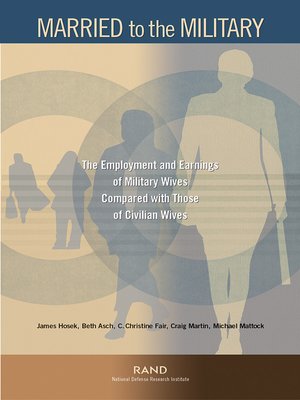Married to the Military
ebook ∣ The Employment and Earnings of Military Wives Compared with Those of Civilian Wives
By James Hosek

Sign up to save your library
With an OverDrive account, you can save your favorite libraries for at-a-glance information about availability. Find out more about OverDrive accounts.
Find this title in Libby, the library reading app by OverDrive.



Search for a digital library with this title
Title found at these libraries:
| Library Name | Distance |
|---|---|
| Loading... |
Today's military is a military of families; many service members are married, and many of their spouses work and contribute to family income. But military wives earn less than civilian wives, and this study seeks to understand why. The authors find that military wives, knowing they are likely to move frequently, are willing to accept jobs that offer a lower wage rather than to use more of their remaining time at a location to find a higher-wage job. Compared with civilian wives, military wives tend to work somewhat less if they have young children but somewhat more if their children are older. The probability that military wives work declines with age, although it changes little with age in the civilian world. This probability declines more rapidly for wives with a college education, most of whom are officers' wives. Although it is often assumed that military families live in rural areas where the job opportunities for wives are poor, the authors found fairly small differences in the location of civilian versus military families. Finally, whereas in the civilian world an increase in the unemployment rate leads to a slight increase in the probability that wives worked during the year and the probability that they worked full-time (responding as "added workers" to the loss or threat of loss of their husbands' work), military wives appear to respond as workers with a more permanent attachment to the labor force.







